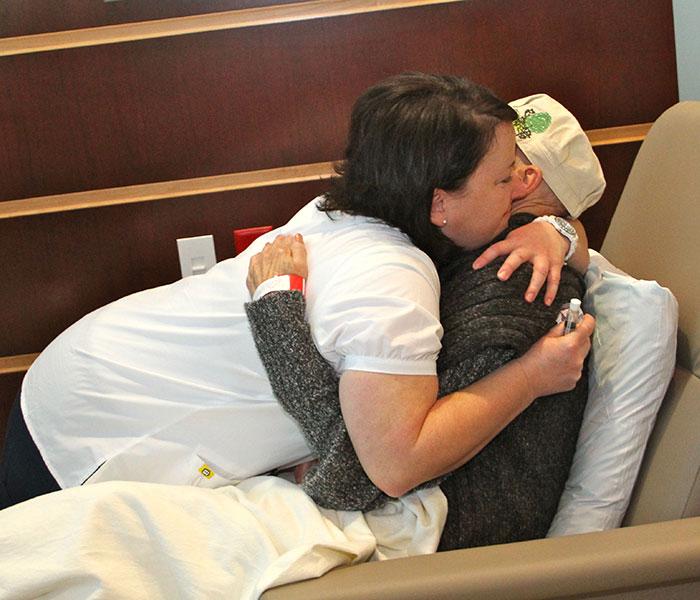In part one of this blog, I attempted to clarify the clinical role of an oncology infusion room nurse. Excellent clinical skills paired with diverse social skills make this nursing job so unique. Nursing school and clinicals do not fully prepare us for the job, because these skills are developed through on-the-job training. Outpatient nursing requires different skills than inpatient. Often, in the inpatient setting, the nurse treats patients and families one at a time with a large team of providers on a short term basis. The outpatient oncology infusion nurse usually is treating patients and family members over a long period of time.
In part one, I referenced chicken sweaters and ice fishing. Recently, I had a patient who came in for a Velcade injection presenting with left chest pain, but all he wanted to talk about was his ice fishing experience the day before on a lake that had only three inches of ice. Within the first three minutes of him walking through the door, I was concerned about his chest pain, his vital signs, getting a provider to the infusion room, starting an IV, drawing labs, and wondering why he would ice fish on only three inches of ice. While listening and responding to his ice fishing story, as clearly I was not going to be able to take care of him until he told me about the trout he caught the day before, I was expediting urgent care. Two infusion chairs over, a young colon cancer patient was knitting chicken sweaters for her son’s chickens. It was vitally important to her, as she was acutely aware that she may not be alive next winter. It was also important to her, that I see the pictures of the chickens and their sweaters on her phone, all the while monitoring her FOLFOX administration.
The ability of an infusion nurse to go from chair to chair, immediately changing the way he/she interacts with patients is an art. The nurse needs to have the wisdom to know when to speak, when to be silent and listen, when to just hold a hand, and when to intervene on a patient’s behalf. One patient may have had a bad scan review and be dealing with transitioning to hospice, while in the next chair the patient may be finishing his/her last curative chemotherapy. One chair may have a patient who just lost a job or lost a family relative and the next chair may have an affluent, highly successful business man/woman who acts like the nurse should be privileged to take care of him/her.
The infusion room nurse may discover abuse/neglect in the home and need to contact social services. The nurse may have to deal with patient transportation issues, discovering there is no food in the home, and/or the patient’s power having been shut off. Sometimes, the nurse may encounter social issues that are against their moral code. Once, a married patient brought her lover to the infusion room while the husband was on his way to pick her up. A nurse must adjust to the variety of situations that arise, and provide resources to deal with the issues, while still offering support and excellent nursing care.
Each day we care for oncology patients who are physically complex patients and who often have complex social situations in their lives. The oncology infusion nurse is an adaptable nurse with incredible assessment skills, who is able to give excellent clinical nursing care while providing an array of emotional, social, and spiritual support through the art of nursing.






